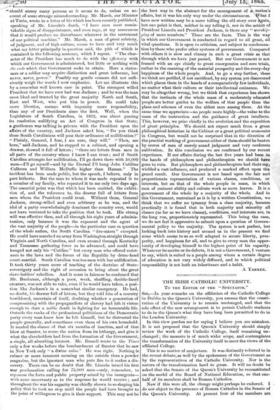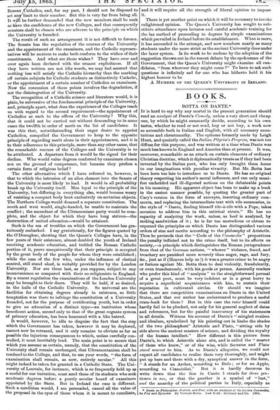THE IRISH CATHOLIC UNIVERSITY.
To THE EDITOR OF THE " SPECTATOR."
Sin,—In your remarks on the affiliation of the Catholic College in Dublin to the Queen's University, you assume that the consti- tution of the University is to remain unchanged, and that the sole effect of the new arrangement is to permit Catholic students to do in the Queen's what they have long been permitted to do in the London University.
In this view pardon me for saying I believe you are mistaken. It is not proposed that the Queen's University should simply review the work of the Catholic College, itself remaining un- changed ; the measure is of much wider scope, and contemplates the transformation of the University itself to meet the views of the affiliated College.
This is no matter of conjecture. It was distinctly referred to in the recent debate, as well by the spokesman of the Government as by the representatives of the. Catholic University. Nor is the nature of the transformation hard to guess. It will no doubt be asked that the Senate of the Queen's University be reconstituted on the model of the Board of National Education, so that one- half of its members shall be Roman Catholics.
Now if this were all, the change might perhaps be endured. I do not object to the presence of Roman Catholics in the Senate of the Queen's University. At present four of the members are
Roman tholics, and, for my part, I should not be disposed to set an limit to their number. But this is very far from being all. It w. be farther demanded that the new members shall be such as ve the confidence of the new Colleges, and that consequently senators shall be chosen who are adverse to the principle on which the University is founded.
The result of such an arrangement it is not difficult to foresee. The Senate has the regulation of the courses of the University and the appointment of the examiners, and the Catholic represen- tatives will be anxious to make both conform to the wishes of their constituents. And what are those wishes? They have over and over again been declared with the utmost explicitness. If all they have written are not idle words, we may feel assured that nothing less will satisfy the Catholic hierarchy than the marking off certain subjects for Catholic students as distinctively Catholic, or the appointment of a certain number of Catholics as examiners. Now the concession of these points involves the degradation, if not the disintegration of the University.
The recognition of a Catholic science and literature would, it is plain, be subversive of the fundamental principle of the University, and, principle apart, what does the experience of the Colleges teach us with regard to the second requirement—the appointment of Catholics as such to the offices of the University? Why this, that it could not be carried out without descending to in some cases the twelfth in order of merit on the list of candidates. It was this that, notwithstanding their eager desire to appoint Catholics, compelled the Government to keep to the opposite principle of regarding merit alone in their appointments, and it is to their adherence to this principle, more than any other cause, that the remarkable success of the Colleges and the University is to be attributed. A departure from it would be the signal for their decline. Who would value degrees conferred by examiners chosen not on the ground of competence, but because they profess a certain form of religious belief ?
The other alternative which I have referred to, however, is that to which the intrusion of an alien element into the Senate of the University is most likely to lead. It would in all probability break up the University itself. Men loyal to the principle of the University, but differing in everything else, would become weary of resisting a compact body bent exclusively on sectarian objects. The Northern College would demand a separate constitution. The South and west would, single-handed, be unable to maintain the conflict ; the ascendant of the Ultramontane party would be com- plete, and the object for which they have long striven—the destruction of united education—would be attained.
Such is the sea of troubles on which the Government has gra- tuitously embarked. I say gratuitously, for the figures quoted by the O'Donoghue, showing that the Queen's Colleges have, in the few years of their existence, almost doubled the youth of Ireland receiving academic education, and trebled the Roman Catholic portion of it, prove unequivocally that their principle is accepted by the great body of the people for whom they were established ; while the case of the few who, under the influence of clerical control, still stand aloof, is suitably provided for by the London University. Nor are these last, as you suppose, subject to any inconvenience as compared with their co-religionists in England. By a recent regulation the examinations of the London University may be brought to their doors. They will be held, if so desired, in the halls of the Catholic University. So universal are the facilities for obtaining degrees already in existence, so little temptation was there to infringe the constitution of a University founded, not for the purpose of certificating youth, but in order to give an education of a distinct type—an institution whose beneficent action, second only to that of the great cognate system of primary education, has been honoured with a like hatred.
It would, however, be idle to disguise the fact that the step which the Government has taken, however it may be deplored, cannot now be retraced, and it only remains to obviate as far as possible the injurious consequences to which, unless carefully con- trolled, it must inevitably lead. The main point is to secure that which you assume as certain, namely, that the constitution of the University shall remain unchanged, that Ultramontanism shall be confined to the College, and that, to use your words, " the form of examination shall remain, as now, entirely secular." All this might indeed be taken for granted in a Catholic State. The Uni- versity of Louvain, for instance, which is so frequently held up as a model for our imitation, must send those of its students who seek academic degrees before a purely secular board of examiners appointed by the State. But in Ireland the case is different. Such a condition would, I am persuaded, cancel all the value of the proposal in the eyes of those whom it is meant to conciliate,
and it will require all the strength of liberal opinion to impose it.
There is yet another point on which it will be necessary to invoke enlightened opinion. The Queen's University has sought to sub- stitute attendance upon lectures and careful academic training for the lax method of proceeding to degrees by simple examinations which prevailed in Ireland before its establishment. What is more, it has succeeded in the attempt, and now numbers nearly as many students under the more strict as the ancient University does under the laser system. Is its work to be undone by the adoption of the suggestion thrown out in the recent debate by the spokesman of the Government, that the Queen's University might examine all can- didates, " from wherever they might come ?" To have to ask such questions is infinitely sad for one who has hitherto held it his highest honour to be
A MEMBER. OF THE QUEEN'S UNIVERSITY IN IRELAND.































 Previous page
Previous page